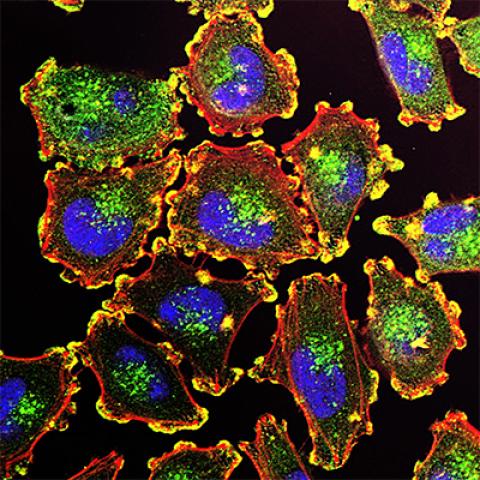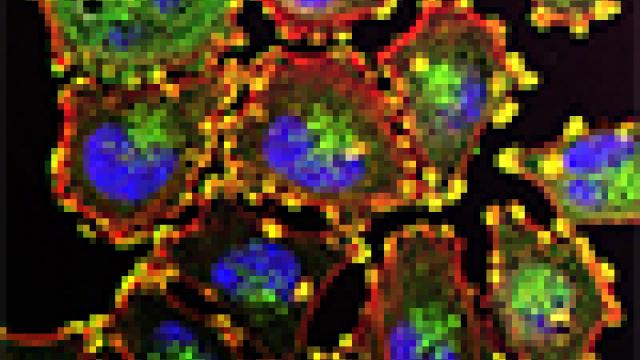
Metastatic melanoma cells
Photo courtesy of NCI Visuals Online
A new study has identified a protein that, when inhibited, can reduce the growth of uveal melanoma in mice. The results were published February 14, 2019, in Cancer Cell.
Uveal melanoma is a cancer that affects pigment cells in the eye, and more than 90 percent of cases are driven by mutations in the Gq-alpha protein. Development of the disease is associated with the activation of YAP, a transcriptional factor that regulates cell growth and suppression of cell death. Drugs developed to date that directly target this protein have been too toxic to use in patients for prolonged periods of time, prompting researchers to explore other possible treatments for this disease.
In previous work, Silvio Gutkind, Ph.D., from the University of California, and his colleagues have found that uveal melanoma is associated with the increased activity of YAP. In the latest work, Gutkind’s team collaborated with researchers in the Center for Cancer Research’s Cancer Data Science Laboratory (CDSL) to identify additional factors at play in the Gq-alpha signaling pathway that could be targeted with drugs.
Taking a computational approach, CDSL investigators analyzed thousands of genes catalogued in NIH’s The Cancer Genome Atlas, looking for ones that have a synthetic lethal interaction with the gene that produces the mutated Gq-alpha protein. A synthetic lethal interaction occurs when two mutated genes lead to cell death but each mutation on its own does not. Drugs that target the synthetic lethal partners of Gq-alpha mutation could therefore be used to selectively kill uveal melanoma cells. The CDSL researchers’ efforts revealed seven such genes, and the one that produces a protein called FAK was suspected to have the most therapeutic potential.
The researchers administered a drug that inhibits FAK, called VS-4718, to uveal melanoma mouse models. “As predicted by our computational analysis, we found that inhibition of FAK was sufficient to reduce uveal melanoma cell proliferation and, if prolonged, to trigger cell death,” says Joo Sang Lee, Ph.D., who led the research for CDSL.
Importantly, clinical trials of VS-4718 in people with other forms of cancer have demonstrated the drug’s safety. Lee notes that this latest work therefore “establishes FAK as a therapeutic target for the treatment of uveal melanoma and opens up the possibility of studying and repurposing existing FAK inhibitors to treat uveal melanoma in future clinical trials.”
The UCSD and CDSL teams plan on using computational and experimental approaches to identify mechanisms of resistance to FAK inhibitors. These efforts could yield new therapies to boost the efficacy of existing FAK inhibitors in patients with metastatic uveal melanoma.


